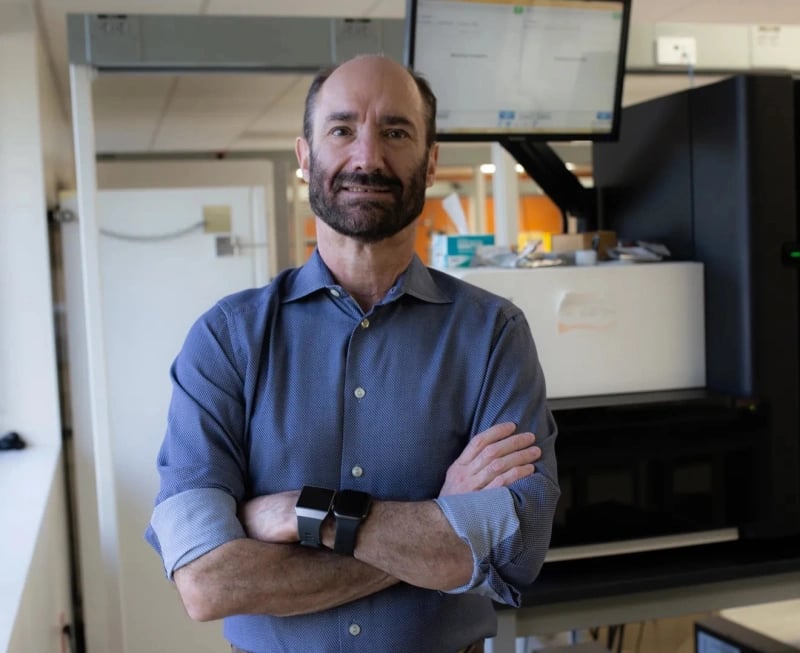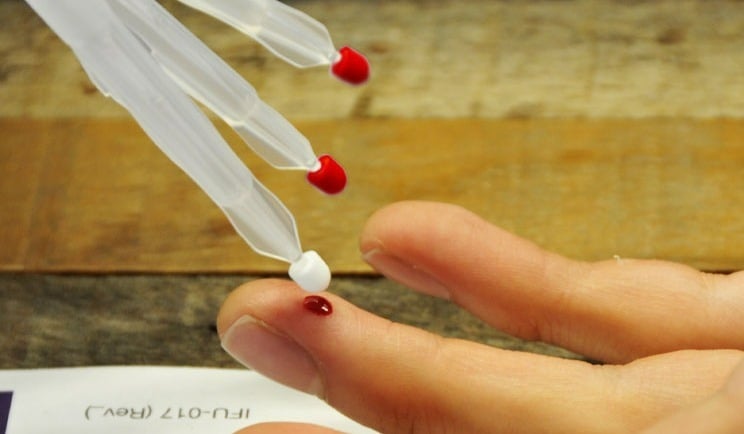Share this
Microsampling Helps Stanford Researchers Develop 'Theranos That Works'
by Neoteryx Microsampling on January 26,2023
An article in The Stanford Daily from Stanford University in California highlights new research led by Michael Snyder, PhD, Stanford Genetics department chair and senior author of the study paper that promises to deliver a "Theranos That Works." Staff Writer Lauren Koong interviewed Dr. Snyder, who explained that Stanford researchers have used a next generation microsampling tool called the Mitra® device to collect and analyze blood samples.
Developed under the Neoteryx microsampling brand at Trajan Scientific and Medical, the Mitra device enabled Snyder and his research team to accomplish what Elizabeth Holmes and her defunct blood sampling company Theranos were unable to achieve: they can measure thousands of molecules from just a few drops of blood from a finger stick.
 (Image: Stanford Medicine; Dr. Mike Snyder)
(Image: Stanford Medicine; Dr. Mike Snyder)
Dr. Snyder said that for this study, he and his lab team used multi-omics technology and blood sample analysis methods to measure thousands of molecules collected on the tiny absorptive 10-microliter VAMS® tip of each Mitra microsampling device.

(Image: Neoteryx/Trajan; Mitra device with VAMS tips collecting a drop of blood)
According to Snyder, this work is a step beyond conventional medicine approaches, whereby a person who is trying to find out if their symptoms indicate an underlying health problem visits their physician who sends them for "blood tests." That typically involves going to a clinical lab for a venipuncture blood draw to collect 10-15 milliliters of blood in multiple tubes to test for a panel of 10-15 different things.
"What we’re trying to do is measure thousands of molecules, so we get a much clearer picture of what’s going on,” said Snyder. Using the newer and less invasive microsampling approach, which is based on a simple finger-stick method to draw just a few drops of blood from a fingertip, the researchers are able to use a much smaller volume of blood to "... follow your metabolic markers, your immune markers, even some neurological markers that can give insights into your mental health.”
The Snyder team at Stanford Medicine used multiple extraction techniques on the blood microsamples to measure lipids, metabolites, proteins and inflammatory markers. After comparing their findings with conventional blood testing methods, they found that the microsampling approach yielded accurate results.
The article also quotes Stanford Medicine professor John Ioanndis, who is not involved in the new study, but was one of the first experts to publicly question claims made by Theranos. According to Ioanndis, a major difference between the Snyder team's research approach and the Theranos approach is that the new study paper has been peer reviewed by other scientists.
This is curated content, which has been summarized for our readers. To learn more about the important research outlined in this news blog, visit the study paper in Nature Biomedical Engineering and the original news article in The Stanford Daily. The news from Stanford Medicine is featured in their News Center and also can be found on several news media sites, including USA Today and GenomeWeb.
To learn more about the Mitra device used in the Stanford Medicine study, visit our Microsampling Products page where we also provide information about our other microsampling solutions. To read peer-reviewed papers from studies that used our microsampling products, visit our Technical Resource Library.
Share this
- Microsampling (41)
- Mitra® Device (34)
- Industry News, Microsampling News (33)
- Company Press Release, Product Press Release (22)
- Research, Remote Research (18)
- Infectious Disease, Vaccines, COVID-19 (15)
- Clinical Trials, Clinical Research (14)
- Biomonitoring, Health, Wellness (10)
- Blood Microsampling, Serology (10)
- Decentralized Clinical Trial (DCT) (8)
- Omics, Multi-Omics (7)
- Venipuncture Alternative (6)
- Skin Microsampling, Microbiopsy (5)
- Harpera Device (3)
- Specimen Collection (3)
- Toxicology, Doping, Drug/Alcohol Monitoring, PEth (3)
- Pharmaceuticals, Drug Development (2)
- Therapeutic Drug Monitoring, TDM (2)
- Antibodies, MAbs (1)
- Environmental Toxins, Exposures (1)
- Preclinical Research, Animal Studies (1)
- hemaPEN® Device (1)
- April 2025 (1)
- February 2025 (4)
- September 2024 (1)
- August 2024 (1)
- May 2024 (2)
- January 2024 (1)
- December 2023 (2)
- November 2023 (3)
- October 2023 (2)
- September 2023 (1)
- August 2023 (3)
- July 2023 (3)
- June 2023 (1)
- May 2023 (2)
- April 2023 (1)
- March 2023 (2)
- February 2023 (1)
- January 2023 (2)
- December 2022 (1)
- November 2022 (1)
- October 2022 (2)
- August 2022 (1)
- April 2022 (1)
- February 2022 (1)
- January 2022 (1)
- December 2021 (1)
- November 2021 (1)
- October 2021 (2)
- September 2021 (1)
- August 2021 (2)
- July 2021 (2)
- June 2021 (2)
- April 2021 (1)
- March 2021 (2)
- February 2021 (1)
- January 2021 (1)
- December 2020 (1)
- November 2020 (1)
- October 2020 (1)
- September 2020 (2)
- August 2020 (3)
- July 2020 (3)
- June 2020 (2)
- May 2020 (1)
- April 2020 (3)
- October 2019 (1)
- March 2019 (1)
- January 2019 (1)
- November 2018 (1)
- August 2018 (1)
- July 2018 (1)
- June 2017 (1)
- April 2017 (1)
- March 2017 (1)
- February 2017 (1)
- May 2016 (1)
- December 2015 (1)
- October 2015 (1)
- August 2015 (1)
- August 2014 (1)
- July 2014 (1)

No Comments Yet
Let us know what you think